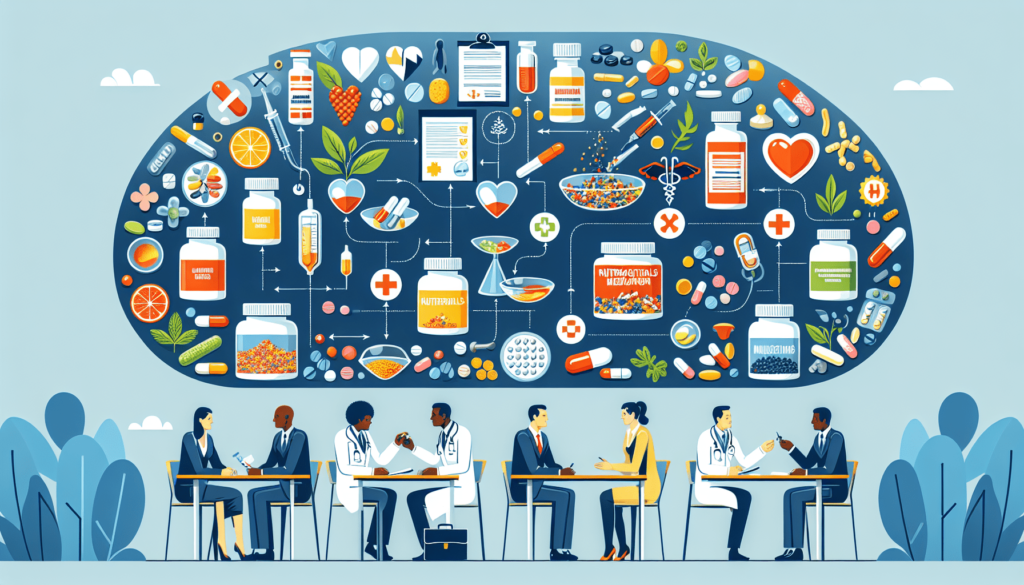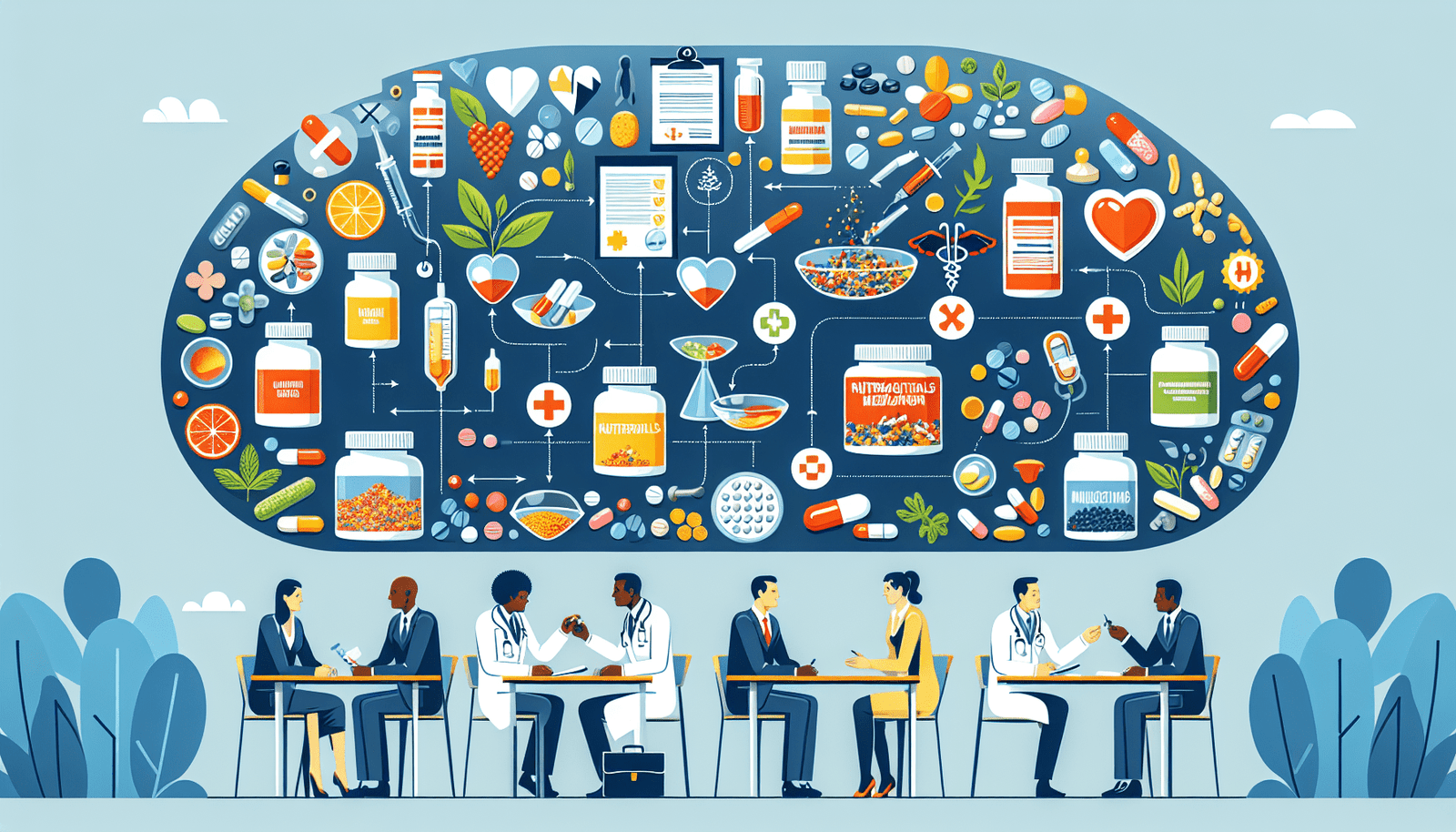In this article, we explore the fascinating world of nutraceuticals and medications and delve into the question of whether there are any potential interactions between the two. As you embark on this informational journey, we will acquaint you with the concept of nutraceuticals, those natural products with health benefits, and how they relate to medications typically prescribed by healthcare professionals. By the end, you will have a better understanding of whether these two worlds can coexist harmoniously or if caution is necessary when combining them. So, let’s explore together the potential interactions between nutraceuticals and medications!

Overview of Nutraceuticals and Medications
Nutraceuticals and medications play an essential role in maintaining our overall health and well-being. While both are commonly used to improve various health conditions, it is important to understand the differences between the two.
Definition of Nutraceuticals
Nutraceuticals, also known as functional foods, are dietary supplements or food-derived products that provide health benefits beyond their basic nutritional value. They are formulated to provide additional nutrients, vitamins, minerals, or other bioactive compounds that can promote health and prevent diseases. Nutraceuticals can be consumed in various forms, such as capsules, tablets, powders, or functional foods and beverages.
Definition of Medications
Medications, on the other hand, are substances used to diagnose, treat, or prevent diseases or medical conditions. They are prescribed or recommended by healthcare professionals to alleviate symptoms, cure diseases, or manage chronic conditions. Medications can be synthetic drugs, biologics, or natural products that have undergone rigorous testing and have been proven safe and effective for specific medical purposes.
Types of Nutraceuticals
Nutraceuticals encompass a wide range of products, each targeting specific health benefits. Here are some common types of nutraceuticals:
Vitamins and Minerals
Vitamins and minerals are essential nutrients that our body needs in small quantities to function properly. Nutraceuticals in this category include vitamin C for immune support, vitamin D for bone health, and iron and calcium supplements.
Herbal Supplements
Herbal supplements are derived from plants and are believed to have various health benefits. Examples of herbal supplements are ginkgo biloba for cognitive function, echinacea for immune support, and turmeric for its anti-inflammatory properties.
Probiotics
Probiotics are beneficial bacteria that can improve our gut health. They can be found in certain yogurts, fermented foods, or taken as supplements. Probiotics help maintain a healthy balance of gut bacteria and aid in digestion and overall immune function.
Omega-3 Fatty Acids
Omega-3 fatty acids are polyunsaturated fats that are crucial for heart health and brain function. They can be obtained from fatty fish or taken as fish oil supplements. Omega-3 fatty acids have anti-inflammatory properties and may reduce the risk of cardiovascular diseases.
Protein Supplements
Protein supplements are often used by athletes and individuals who require additional protein intake. They come in various forms like whey protein, soy protein, or pea protein, and can aid in muscle growth, recovery, and overall body composition.
Others
There are numerous other nutraceuticals available including fiber supplements, antioxidant-rich products like green tea extracts or resveratrol, and specialized formulations targeting specific health conditions such as joint health, eye health, or weight management.
Types of Medications
Medications can be categorized into two main types: prescription drugs and over-the-counter drugs.
Prescription Drugs
Prescription drugs are medications that can only be obtained with a prescription from a healthcare professional. These medications are typically used to treat complex medical conditions, manage chronic diseases, or have potential side effects that require careful monitoring. Examples of prescription drugs include antibiotics, antidepressants, blood pressure medications, and chemotherapy drugs.
Over-the-Counter Drugs
Over-the-counter (OTC) drugs, also known as non-prescription drugs, are medications that can be purchased without a prescription. These are usually used to treat common ailments, such as headaches, allergies, coughs, colds, and minor pain relief. OTC drugs are generally considered safe when used as directed, but it is essential to read and follow the instructions and consult a pharmacist if you have any concerns or questions.

Absorption and Metabolism of Nutraceuticals and Medications
After ingestion, both nutraceuticals and medications must go through absorption and metabolism processes to exert their effects on the body. Understanding how they are absorbed and metabolized is crucial in assessing their potential interactions.
Mechanisms of Absorption
Nutraceuticals and medications are absorbed through various mechanisms in the gastrointestinal tract. Factors such as solubility, molecular weight, and the presence of food can influence absorption. Nutraceuticals, which are often derived from food, can be absorbed through passive diffusion, active transport, or carrier-mediated transport mechanisms.
Enzyme Interactions
The metabolism of both nutraceuticals and medications involves interactions with various enzymes in the body. Enzymes can either break down or activate the compounds, affecting their absorption and bioavailability. For example, grapefruit juice contains compounds that inhibit the activity of certain enzymes, resulting in altered metabolism of medications and potentially higher blood drug levels.
Liver Metabolism
The liver plays a crucial role in metabolizing both nutraceuticals and medications. It is responsible for detoxifying drugs and converting them into inactive or more water-soluble forms for excretion. Nutraceuticals can undergo similar metabolic processes, although they are generally less concentrated and have fewer potential interactions with liver enzymes compared to medications.
Renal Excretion
After metabolism, both nutraceuticals and medications are excreted from the body through various routes, with renal excretion being the primary route. The kidneys filter the compounds from the bloodstream and eliminate them through urine. The rate of excretion can be influenced by factors such as kidney function, pH of the urine, and the presence of other substances that can compete for excretion.
Potential Interactions between Nutraceuticals and Medications
When taking both nutraceuticals and medications simultaneously, there is a potential for interactions to occur. These interactions can be categorized into two main types: pharmacokinetic and pharmacodynamic interactions.
Pharmacokinetic Interactions
Pharmacokinetic interactions involve changes in the way the body absorbs, distributes, metabolizes, or excretes nutraceuticals or medications. These changes can affect the concentrations of either substance in the body, potentially leading to under or over-dosing. For example, the absorption of certain medications may be reduced when taken with high-fiber nutraceuticals, resulting in decreased effectiveness.
Pharmacodynamic Interactions
Pharmacodynamic interactions occur when nutraceuticals and medications interact at the site of action. This can result in additive, synergistic, or antagonistic effects, altering the therapeutic outcomes. An example of a pharmacodynamic interaction is the combined use of blood thinners and fish oil supplements, which can increase the risk of bleeding due to the blood-thinning effects of both substances.
Adverse Effects
Interactions between nutraceuticals and medications can also lead to adverse effects. These effects can range from mild and temporary to severe and life-threatening. Adverse effects can include gastrointestinal disturbances, allergic reactions, organ toxicity, and changes in the efficacy or safety of the medication. It is essential to be aware of potential adverse effects and consult a healthcare professional if any concerns arise.
Specific Nutraceutical-Medication Interactions
While there are numerous potential interactions between nutraceuticals and medications, some specific examples are worth highlighting:
Grapefruit and Statins
Grapefruit and grapefruit juice contain compounds that inhibit liver enzymes responsible for metabolizing certain statin medications. This can result in increased blood levels of the statin, increasing the risk of side effects such as muscle damage or liver toxicity.
St. John’s Wort and Antidepressants
St. John’s Wort, an herbal supplement used to alleviate symptoms of depression, can interact with antidepressant medications. It can increase the metabolism of these medications, leading to reduced effectiveness and potentially worsening symptoms.
Fish Oil Supplements and Blood Thinners
Fish oil supplements contain omega-3 fatty acids, which have a mild blood-thinning effect. When taken with blood-thinning medications like warfarin or aspirin, this can increase the risk of bleeding. It is crucial to monitor blood clotting parameters and consult a healthcare professional before combining these substances.
Vitamin K and Warfarin
Warfarin is a commonly prescribed blood-thinning medication that works by interfering with vitamin K-dependent clotting factors. Consuming large amounts of vitamin K-rich foods, such as leafy greens and broccoli, can counteract the effects of warfarin, making it less effective.
Iron Supplements and Antibiotics
Antibiotics like tetracycline or ciprofloxacin can form complexes with iron, reducing the absorption and effectiveness of both substances. It is therefore recommended to take iron supplements at least two hours before or after taking antibiotics to avoid potential interactions.
Factors Influencing Interactions
Several factors can influence the interactions between nutraceuticals and medications. It is important to consider these factors to minimize potential risks:
Dose and Timing
The dose and timing of both nutraceuticals and medications can affect their potential interactions. Taking substances too closely in time or at high doses can increase the likelihood of interactions. It is crucial to follow the recommended dosage instructions and spacing provided by healthcare professionals.
Individual Variations
Individual variations, such as genetics, age, underlying health conditions, and concurrent medications, can influence how the body metabolizes and responds to nutraceuticals and medications. It is important to consider these factors and consult a healthcare professional to ensure personalized and safe use.
Duration of Use
The duration of use of both nutraceuticals and medications can also impact their interactions. Some interactions may only occur with long-term or chronic use, while others can be immediate. Regular monitoring and reevaluation of nutraceutical and medication use are essential to identify and manage potential interactions.
Potential Benefits of Nutraceutical-Medication Interactions
While interactions between nutraceuticals and medications can pose potential risks, certain scenarios may offer benefits:
Enhanced Therapeutic Effects
In some cases, nutraceuticals and medications can interact synergistically, enhancing their therapeutic effects. For example, combining omega-3 fatty acids with certain anti-inflammatory medications may provide additional benefits in managing conditions such as rheumatoid arthritis.
Reduced Side Effects
Combining nutraceuticals with medications can also help reduce the side effects associated with medication use. For instance, taking probiotics alongside antibiotics can help prevent or alleviate antibiotic-associated diarrhea by promoting the growth of beneficial gut bacteria.
Improved Medication Compliance
The use of certain nutraceuticals, such as pill organizers or reminder systems, can improve medication compliance, especially for individuals who have difficulty adhering to complex medication regimens. This can ultimately lead to better treatment outcomes and improved overall health.
Precautions and Recommendations
To ensure the safe and effective use of nutraceuticals and medications:
Consulting Healthcare Professionals
It is important to consult healthcare professionals, such as physicians, pharmacists, or registered dietitians, before starting any new nutraceutical or medication. They can provide guidance on potential interactions, individual needs, and appropriate dosages.
Reading Labels and Product Information
Reading labels and product information is crucial to understand the ingredients, potential interactions, and recommended usage of nutraceuticals and medications. Look for reputable sources and consult healthcare professionals if any uncertainties arise.
Monitoring and Reporting Adverse Effects
Regular monitoring of symptoms and side effects is important when using nutraceuticals and medications. If any adverse effects or concerns arise, they should be reported to healthcare professionals. This enables prompt detection and management of any potential issues.
Conclusion
Nutraceuticals and medications can offer valuable benefits to our health and well-being. Understanding their definitions, types, absorption and metabolism processes, as well as potential interactions, is crucial for safe and effective use. By consulting healthcare professionals, staying informed, and monitoring for adverse effects, we can maximize the benefits while minimizing the risks associated with the combined use of nutraceuticals and medications.
